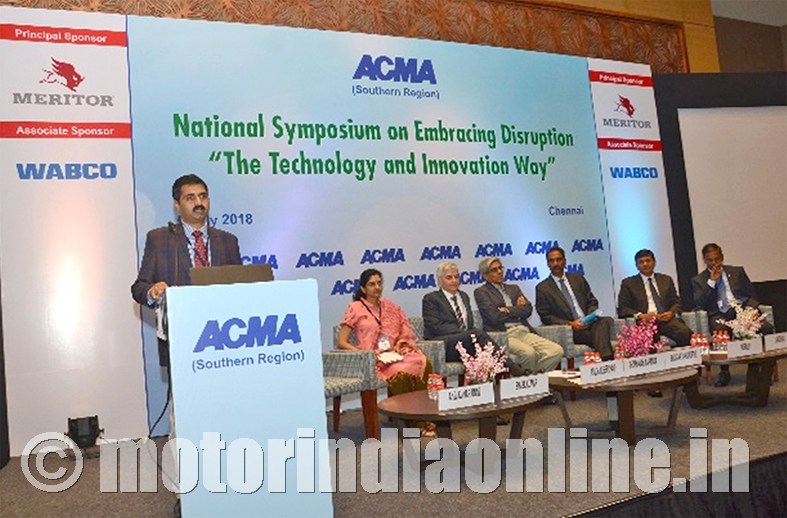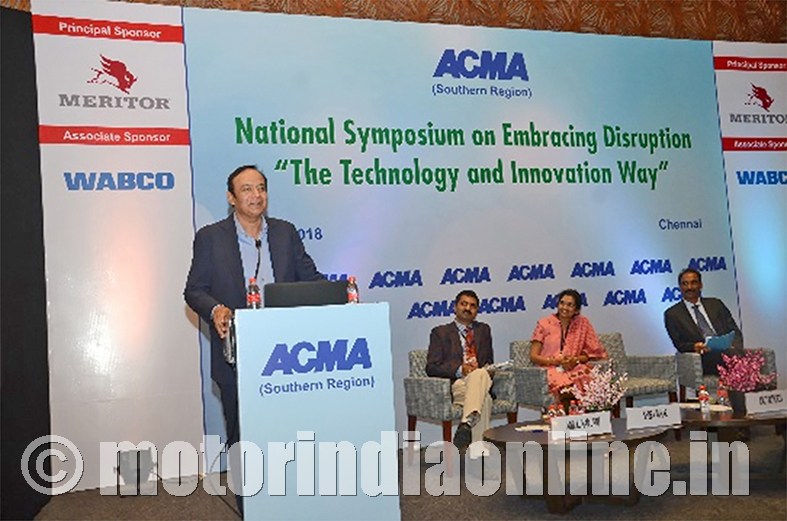By R. Natarajan, Managing Editor & Publisher
The faster the change in technology in the automotive sector, the greater the number of disruptive activities taking place around the world. Among the different factors driving the change in technology are artificial intelligence (AI), 3D printing, etc. In order to face the future challenges arising out of technological revolution in the automotive sector, the Automotive Component Manufacturers Association of India (ACMA), Southern Region, organised a national symposium on “Embracing Disruption – The Technology & Innovation Way” in Chennai.

Mr. Anil Kumar Unni, Senior Director and Regional Secretary, ACMA (Southern Region), kicked off the symposium by welcoming and introducing the experts assembled at the gathering.
Mr. Thimmaiah Napanda, Symposium Chairman, and VP India and Australia, MD and CEO, Meritor India, in his welcome address, said India will become the fastest growing market in the world. This is well reflected in a significant growth in all the segments of the Indian auto sector during 2017.
Ms. Shuba Kumar, Co-Chairperson – Southern Region, ACMA, and Director, Natesan Synchrocones Pvt. Ltd., said that ACMA (SR) has taken several initiatives during the last 3 years in order to bridge the gap between academia and industry. At the national level, ACMA has tied up with IIT Delhi for exchange of knowledge. She requested Dr. Bhaskar Ramamurthi, Director, Indian Institute of Technology – Madras, who was a keynote speaker on the occasion, to have a similar collaboration with the ACMA Southern Region.
Mr. Murali Vaidyanathan, Member, National Executive Committee, ACMA, and Managing Director – South Asia, Hanon Automotive Systems India Pvt. Ltd., who spoke on the ‘Embracing Technology is the Future’, said the automotive sector has been witnessing a big change in the last decade as compared to the previous seven decades. In the technology space, there are new trends emerging such as connected vehicles, autonomous cars, electrification, etc. By 2030, at least 50% vehicles will be autonomous, and artificial intelligence will soon be a new technology. Also by 2030, 10% of the vehicle users will go for share mobility (e.g., Ola, Uber, etc.). With this change, the auto component industry will face more challenges in the coming days.

Dr. Bhaskar Ramamurthi, Director, Indian Institute of Technology – Madras, in his special address, observed that with the new vehicle technology, there will be a lot of disruptive objects of desire. IIT Madras is the first institution to set up IIT Research Park with its major focus on automotive R&D. To meet disruptive challenges, there is need for partnership with start-ups / academia, etc.
Mr. Erich Nesselhauf, MD & CEO, Daimler India Commercial Vehicles Pvt. Ltd., shared his views on the Daimler’s experience on various new initiatives, including the autonomous truck which has become more successful. With the GST roll-out in India, truck owners are able to derive more benefits, including driving of more kilometres without any hassle.
Mr. J. Sridhar, Member of ACMA Executive Committee and ACMA Zonal Coordinator (Chennai & nearby), and CEO, Magal Engineering Tech Pvt. Ltd., proposed a vote of thanks.
During the day-long session, experts from various automotive companies shared their views and experiences which can overcome the challenges arising out of disruptive technology.